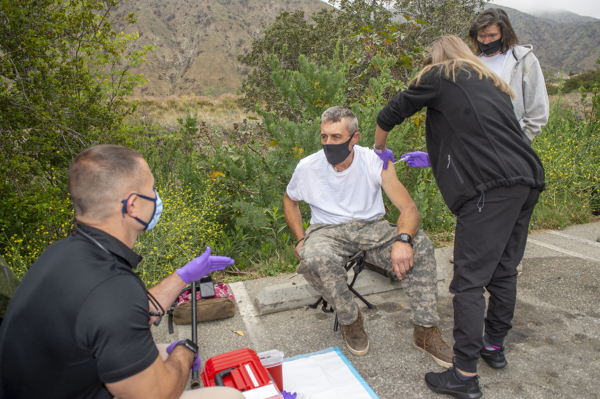State Senator Sydney Kamlager opens the conference by underscoring the urgent need the bill seeks to address.
By Jeremy Deutchman

Brett Feldman, left, talks with a homeless patient as Sandra Valencia administers him a COVID-19 shot in April 2021. (USC Photo/Gus Ruelas)
Already at crisis levels before the arrival of COVID-19, homelessness in Los Angeles County now affects more than 66,000 people. The vast majority of them never see a doctor, even when they have serious health issues – last year, more than 1,300 people who are unsheltered died.
“Homeless individuals grapple with the competing priorities of basic survival needs,” said Brett Feldman, MSPAS, PA-C, director of the Keck School of Medicine of USC’s Street Medicine program. “If you don’t know where your next meal is coming from, or where you’re going to spend the night, you don’t have time to focus on your health.”
Maximizing opportunities to serve the homeless population with appropriate medical care was the topic of Keck Street Medicine’s recent 3rd Annual LA Street Medicine Symposium. The event was aimed at removing barriers that prevent homeless people from getting the care they need – both by expanding the ranks of professionals who can deliver the care and by highlighting efforts to streamline Medi-Cal’s ability to cover it.
One such effort is California Assembly Bill 369, introduced by Senator Sydney Kamlager (D-Los Angeles) last February. Senator Kamlager kicked off the conference by building a moral argument for the passage of the bill, which passed through the appropriations process in California’s State Senate on August 26 and is now moving to the Senate floor. The legislation would ensure that care providers could be reimbursed for treating patients outside the context of a traditional clinical setting.
“When you accompany amazing teams like Brett’s out on the street, you see first-hand that quality care is not just about how you administer medicine, but also how you’re sharing compassion, empathy and lack of judgement,” Kamlager said. “Street medicine can take place in front of a tent, or under a freeway, but it is health care nonetheless.”
She also pointed to compelling economic reasons for providing health care to the unhoused. “Access to consistent care helps stabilize clients from a mental, physical and behavioral health perspective, ultimately increasing homeless people’s trust in the system and moving them more quickly to housing and jobs,” she said.
The symposium outlined the fundamentals of street medicine and how they are used to engage patients, as well as offering guidelines for practice. Participants earned continuing medical education credits and had a chance to hear directly from a panel of homeless people who have benefitted from critical Street Medicine services.
“I’ve been homeless for over 10 years and have been diagnosed with rheumatoid arthritis,” said Kevin, a member of the panel. “Street Medicine has helped me immensely; I wouldn’t know what to do without those guys.”
It was a widely shared sentiment among panelists. “I’m 47 and have been homeless for nearly 18 years,” said Katrina. “I was born addicted and have stayed addicted, but thanks to Keck, I’m getting a better life. The Street Medicine team has been unbelievable, and to know that you matter to someone is really nice.”
In his remarks at the symposium, Feldman emphasized the impact street medicine has on clients, and he urged those assembled to “fight retreat from the street.”
“It’s easy to get burned out by frustration or compassion fatigue, but we need to resist the impulse to fall back on brick-and-mortar care because it’s convenient to expect patients to come to us even if they can’t,” he said. “Driven by duty, pushed by our pursuit of justice and led by love for the clients we serve, we can make a vital difference in people’s lives and in the health of our community.”
To learn more about the Street Medicine program, visit us online.